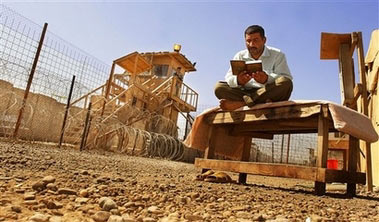
An Iraqi
detainee reads the Quran, Islam's holy book, as he waits to be released at
Abu Ghraib prison, west of Baghdad in Iraq Sunday, June 11, 2006. Around
230 detainees were released from the four American run prisons of Cropper,
Suse, Bucca and Abu Ghraib, after many were taken to Abu Ghraib prison for
processing before release. [AP Photo] |
US and Iraqi authorities released more than 200 prisoners Sunday in an
ongoing bid to promote national unity, but that effort faltered as Sunni Arabs
demanded more releases and the Shiite-controlled parliament locked in stalemate.
Sunni Arab Vice President Tariq al-Hashimi congratulated dozens of inmates
waiting at the Abu Ghraib detention center west of Baghdad to board buses
carrying them to freedom. He urged the Shiite-led government to free more
prisoners and demanded compensation for the former detainees.
"We will continue the release of detainees until the last Iraqi prisoner is
set free," al-Hashimi said, addressing the inmates lined up behind a wire fence,
many holding Qurans and prayer rugs.
"And this campaign won't stop at US prisons but (will continue) to the
prisons run by the interior and defense ministries."
A suicide car bomber slammed into a checkpoint near the city of Baqouba,
killing at least eight people and wounding four. The bombing came the same day
al-Qaida in Iraq vowed to carry out "major attacks" in the wake of Wednesday's
killing of leader Abu Musab al-Zarqawi in a US airstrike in the area.
The US military said it had completed an autopsy on al-Zarqawi on Sunday, but
the findings were not immediately released. US commanders initially said
al-Zarqawi died in the airstrike but later said he survived and died of his
wounds soon after.
The car-bomb victims - seven Iraqi soldiers and one civilian - were
among nearly 40 people killed nationwide as militants signaled the insurgency
would continue despite the death of Iraq's most-feared terrorist.
Insurgents elsewhere set a fire in a vegetable market and engaged in a
gunbattle with British soldiers, which left five civilians dead and more than a
dozen hurt by the crossfire in the southern city of Amarah. A British soldier
also was wounded.
Police Capt. Hussein Karim said insurgents started the blaze in the market to
draw the troops into an ambush. But the British Defense Ministry said soldiers
were sent to search the suspected launch site of a rocket attack and came under
small-arms fire.
The ministry said there were reports of "a small number of terrorist
casualties."
The 230 detainees being released Sunday from US-run prisons around the
country were among 2,500 detainees that Prime Minister Nouri al-Maliki had
promised to release by June 30. The first batch of 594 was freed Wednesday.
"I'm not thinking about myself right now, I'm thinking about the thousands
who are still here," said Abdul Kareem Yassin Amash, clutching an envelope with
$170 given to him by al-Hashimi's Iraqi Islamic Party.
The 38-year-old former pilot, who said he was arrested just over a year ago
in the northern city of Mosul, said he did not know why he had been detained and
expressed concern that it could happen again.
Lt. Col. Kier-Kevin Curry, a spokesman for US military detainee operations,
said 14,300 people remained in coalition detention facilities.
The US military did not provide a detailed description of those being
released, but most were believed to be Sunnis, the minority that was dominant
under ousted leader Saddam Hussein but lost power after his ouster.
Sunnis frequently complain of random detentions and maltreatment at the hands
of the Shiite-led government. The prisoner releases are seen as a key step
toward soothing that anger and dampening the Sunni-led insurgency.
Arkan Abdullah, 17, from the strife-prone province of Salahuddin, said he was
arrested Feb. 21 and accused of illegally possessing a weapon, but he was
willing to give the new government a chance.
Al-Maliki's new security team, meanwhile, moved ahead with a plan to restore
security in Baghdad, which has suffered the most from suicide attackers,
roadside bombs and sectarian death squads.
"We will unveil a security plan this week," Defense Minister Gen. Abdul-Qader
Mohammed Jassim al-Mifarji told The Associated Press. He would not provide
details.
Al-Maliki promised such a security plan weeks ago.
Al-Qaida in Iraq vowed to carry out "major attacks," insisting in a Web
statement Sunday that it was still powerful after the death of its leader. The
statement also said the group's leadership "renews its allegiance" to Osama bin
Laden.
George Casey, the top US general in Iraq, told Fox News that he expected
al-Qaida "to try to do what they said."
"I think what you're going to see is an enhanced security operation here
announced by the prime minister in Baghdad over the course of the coming week
and a tightening of security in the Baghdad area," he said.
Iraq's government, meanwhile, faced a new stalemate as the Iraqi parliament
was forced to postpone its session to give the main political blocs more time to
agree on the exact powers of the Sunni Arab parliament speaker. Al-Maliki met
with party representatives Saturday, but failed to break the
deadlock.